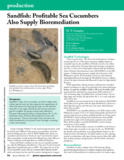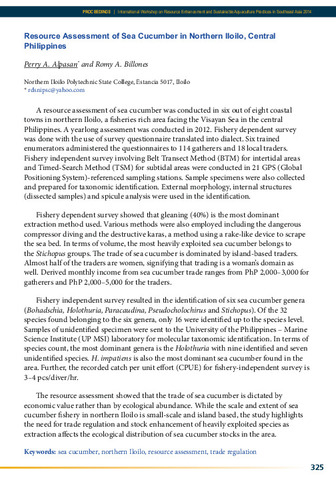Establishing a community-based sea cucumber ranch: Merging science with local knowledge
| dc.contributor.author | Altamirano, Jon | |
| dc.contributor.author | Noran-Baylon, Roselyn D. | |
| dc.contributor.author | Montinola, Quenie S. | |
| dc.date.accessioned | 2024-07-11T01:44:25Z | |
| dc.date.accessioned | 2024-07-30T01:23:25Z | |
| dc.date.available | 2024-07-11T01:44:25Z | |
| dc.date.available | 2024-07-30T01:23:25Z | |
| dc.date.issued | 2024-07 | |
| dc.identifier.uri | http://hdl.handle.net/20.500.12066/7484 | |
| dc.description.abstract | Sea cucumbers are expensive, but natural wild stocks are overfished, especially in the tropics. This is why sea cucumber farming is increasingly gaining popularity worldwide, aside from the anticipated high economic gains from its dried food products. Hatchery production and practical farming technologies are available and have been demonstrated in some countries in the Indo-Pacific. However, there are limitations in the establishment of sea cucumber farms elsewhere, especially in the Philippines. The most basic bottleneck is in the identification of the potential pilot site to start a sea-based farming venture. A project at SEAFDEC/AQD, funded by ACIAR, aims to promote community-based production of the tropical sea cucumber Holothuria scabra or sandfish in the central Philippines, among other sites. Sandfish sea ranching involves culturing hatchery-bred native sandfish juveniles on intertidal coasts through a multi-stakeholder management approach. Although a number of scientific studies have established some general criteria for good ecological habitat for growing sandfish, the project has shown that technically generated environmental data is not sufficient information to guarantee a successful farming site. It should be complemented with traditional ecological knowledge to integrate sociocultural and local governance dimensions. Achieving consensus and cooperation among stakeholders (e.g. technical institutions, government, and local communities) are crucial in the initial planning and establishment of a pilot sea cucumber production site. This article highlights the importance of merging traditional ecological knowledge and science-based data as an essential prerequisite in project planning processes and implementation activities. This key strategy ensures that the project is aligned with the needs and expectations of the local stakeholders in order to promote long-term active commitment and engagement, leading to project sustainability. | en |
| dc.language.iso | en | en |
| dc.publisher | Secretariat, Southeast Asian Fisheries Development Center | en |
| dc.subject.lcsh | Sea cucumbers | en |
| dc.title | Establishing a community-based sea cucumber ranch: Merging science with local knowledge | en |
| dc.type | magazineArticle | en |
| dc.citation.volume | 22 | en |
| dc.citation.issue | 1 | en |
| dc.citation.spage | 38 | en |
| dc.citation.epage | 43 | en |
| dc.citation.journalTitle | Fish for the People | en |
| dc.subject.asfa | site selection | en |
| dc.subject.asfa | sea cucumber culture | en |
| dc.subject.asfa | aquaculture | en |
| dc.subject.scientificName | Holothuria scabra | en |
Files in this item
| Files | Size | Format | View |
|---|---|---|---|
| Community-based sea cucumber ranch.pdf | 840.6Kb | application/pdf | View/ |
This item appears in the following Collection(s)
-
Fish for the People [41]
These articles were contributed by SEAFDEC/AQD staff to Fish for the People Magazine



